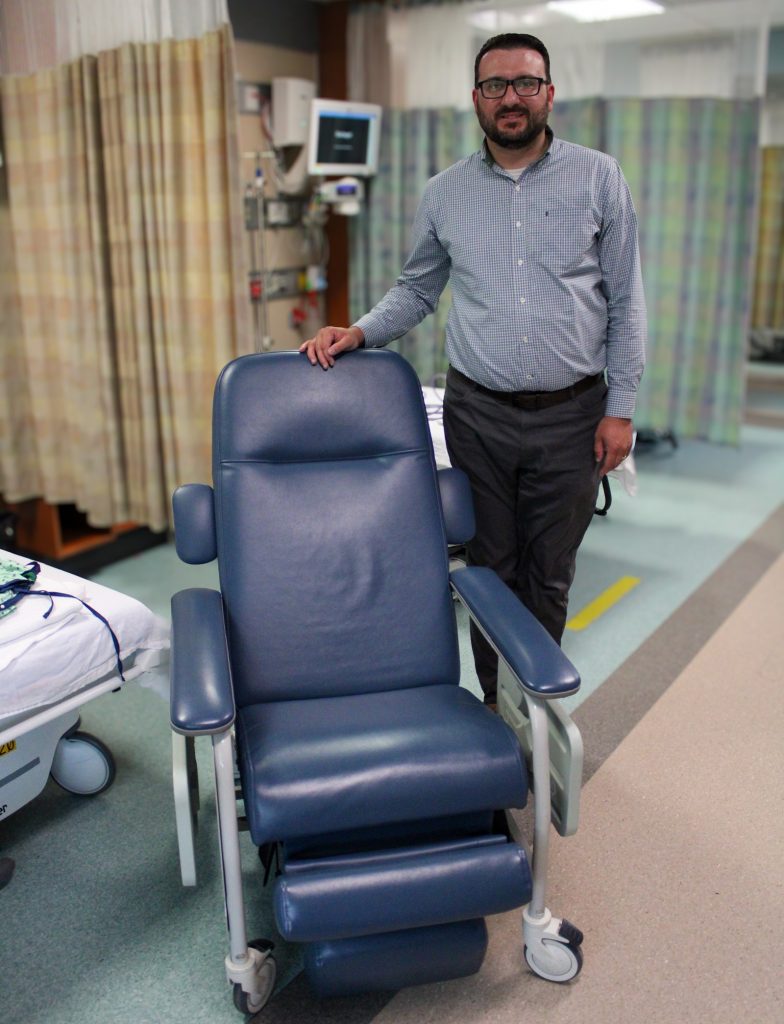When Can You Call a Recliner “Medical Equipment”?
by Graham Strong
 Matt Shonosky, Manager of the 2C Cardiology/Stroke Unit with the new specialized recliner purchased through the Family CARE Grant Program for patients with CHF.
Matt Shonosky, Manager of the 2C Cardiology/Stroke Unit with the new specialized recliner purchased through the Family CARE Grant Program for patients with CHF.Family CARE Grant Helps CHF Patients Feel More at Home
For people with Chronic Heart Failure or CHF, something as simple as sitting or lying down can be torturous.
“If they’re lying flat, they can feel like they’re drowning and can’t catch a breath,” said Matt Shonosky, Manager of the 2C Cardiology/Stroke Unit. “At home, they may have a recliner that helps them sit somewhat upright but keeps their legs elevated.”
This helps relieve chronic symptoms in many ways, Shonosky said. Not only does it help the fluid move from the legs, it means the heart and lungs are not working as hard. Reducing stress on the heart and lungs has a cascading effect on the whole body, helping chronic sufferers cope better with their disease. Recliners work so well that many people with CHF will sleep in their chairs at home rather than in bed.
However, if they need to come to the Thunder Bay Regional Health Sciences Centre for acute care, they may find that they just can’t get comfortable.
“People with CHF can have flare-ups that require them to be in hospital for several days,” Shonosky said. “Even a hospital bed with all its adjustable features may not give the patient that zero-gravity feeling they need to be comfortable enough to sleep.”
Thanks to generous donors like you who support the Family CARE Grant Program, the unit now has a new specialized recliner for those patients who need it.
“We’re really focusing on the patient experience,” Shonosky said. “To be able to mimic what they have at home is not only more comfortable for the patients, it means they can get the rest they need and potentially get home faster.”
Shonosky said that the unit used to have a recliner on hand in the past. However, it was big and bulky just like many of the chairs you’ll find in a typical furniture store. This is fine for at home, but in a hospital environment, bulky chairs can be challenging. The new recliner has a slimmer profile, so it’s easier to move to where it’s needed. It’s also medical grade, making the recliner longer lasting and easier to sanitize between patients.
Shonosky said that one of the best things those with CHF can do is not sit.
“We encourage all of our CHF patients to get up and to get moving,” he said. “The longer you lay in bed or a chair, they longer you’ll be in hospital. Even light exercise like walking around can get the heart pumping so that the lungs can get rid of the fluid. Everything starts working better.”
This new recliner for CHF patients is another example of how your support of the Family CARE Grant Program can help patients at our Hospital. CARE stands for “Care Advancements Recommended by Employees” – initiatives dreamed up by frontline staff that improve patient care in some way. The program honours the role employees play in patient care and empowers them to make a difference. Find out what other initiatives the Family CARE Grant Program funded and how you can donate to support this special program at: healthsciencesfoundation.ca/familycare